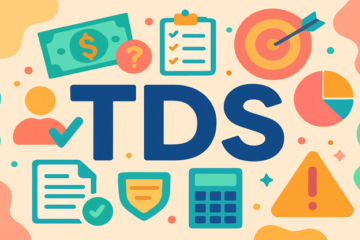At present, the payments made by a firm (partnership firm or an LLP) to a partner are not subjected to TDS. Currently, the TDS is applicable only in the case where the payments are made to an employee of a firm. However, if you draw remuneration from the firm as a partner or if you are taking payments in the form of interest, bonus, or commission then the TDS provisions were not applicable on the said payments.
Introduction
Budget 2024 inserted a new provision in the Act stating that, effective from April 1, 2025, certain payments made to a partner by a firm shall be liable for TDS deduction in accordance with the provisions of Section 194T. Read this blog to get a better understanding of Section 194T.
In this blog we will discuss:
- Type of Payments covered in section 194T
- Rate of deduction of TDS and the limit applicable
- When is the TDS deducted under section 194T
- Applicability of the provisions of Section 194T
- Practical Implication of Section 194T
What are the Payments Covered in Section 194T?
The following payments by a firm to a partner are covered in Section 194T:
- Salary
- Remuneration
- Commission
- Bonus
- Interest on any account (It can be on a loan account or on a capital account)
Rate of Deduction of TDS and Limit for Section 194T
The rate at which TDS is to be deducted is 10%. The TDS is to be deducted only in cases where the aggregate payments to a partner exceed Rs. 20,000 in a financial year.
| Condition | TDS Rate | TDS Threshold |
|---|---|---|
| Aggregate payments to partners such as interest, bonus, commission, or remuneration | 10% | > Rs. 20,000 in a financial year |
When to Deduct TDS under Section 194T?
The TDS is to be deducted at the earlier of the following dates:
- Credit of sum/payment to the account of a partner in the books of the firm
- Payment to the partner
Note: Credit to the partner’s capital account will also be considered for determining the date in (1) above.
Applicability of the Provisions of Section 194T
As mentioned in the Finance Bill 2024, the provisions of Section 194T shall be made applicable from 1st April, 2025.
Practical Implications Due to Insertion of Section 194T
Practically, at present, in family-owned firms, a partner’s remuneration withdrawal from a firm depends on various factors such as cash flow requirements, tax implications, etc. In many cases, the withdrawal is on an ad hoc basis rather than structured. Due to the insertion of the above provisions, the partners may need to rationalize their withdrawal from firms as the withdrawal will entail a TDS deduction at the rate of 10%.
Further, there can be a situation where the remuneration of the partner depends on the profitability of the firm, which is practically determined once the books of the firm are closed for the financial year. So, there can be a situation where firms might need to close simultaneously from the financial year-end considering the due date for the deposition of TDS of the March Quarter is the 30th of April. So, to deduct the TDS on partner remuneration for the year ended on 31st March, the books of accounts of the firm may need to be closed before the said period.
Conclusion
The introduction of Section 194T will now require partners to plan their finances as the applicability of TDS will impact their cash flows. This brings a significant amendment to the Income Tax Act by increasing tax compliance for firms and partners.



